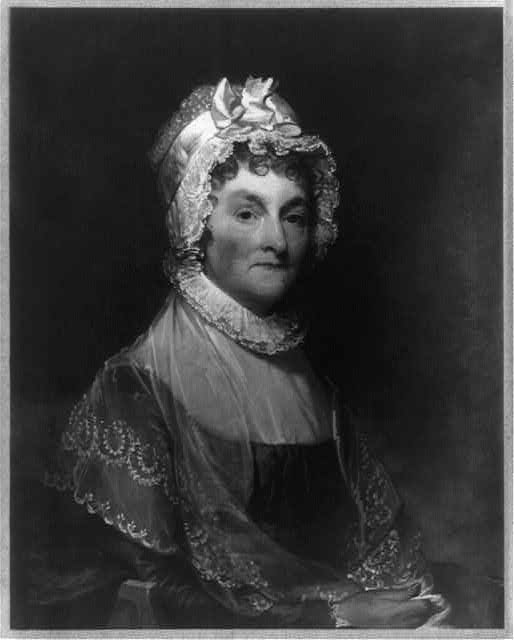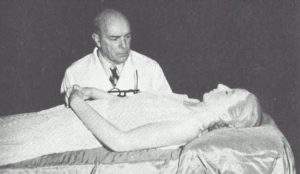Too often in society women are belittled because of their gender, despite their numerous abilities and achievements. Women all over the world fall victims, and struggle to become survivors, of inequality against their male counterparts. Although some improvements have been made over time, there is still much progress to be done in order to establish an equality between men and women in all aspects of life, not just in a few token areas. During the eighteenth century, a few women became advocates for women’s rights and fought for individual freedoms that were attainable for men but rarely for women. One of these advocates was Abigail Adams, first lady to the second President, John Adams. Abigail, a devout wife and American citizen, was more than just a first lady to the president. She was an early feminist voice who refused to stand by and allow women to be suppressed of their capabilities and their rights.
In order to comprehend why Abigail felt so strongly and fought so vigorously for her beliefs, it is important first to understand how her beliefs became rooted. Abigail was the second out of four children from William Smith and Elizabeth Quincy. Her father was a minister of North Parish Congregational Church of Weymouth in Massachusetts colony; her mother Elizabeth was a typical housewife and mother. Abigail was fortunate enough to be born into such an eminent family in New England with a prosperous lineage of statesman, ministers, and merchants. She was raised in a household that wholeheartedly affirmed the beliefs of rational Puritanism, a solid Christian faith, and a strong education.1

From an early age, Abigail was introduced to the limitations of women by being unable to attend school. Growing up in the eighteenth century, education was highly sought after; however, education was primarily for boys, not girls. Boys had the opportunity to study various subjects, such as Latin, math, French, literature, and Greek. Elite families often prepared their boys to receive a higher education, either at Harvard College or abroad. Since girls were not permitted to attend school, Abigail was educated at home. Though her education did include some rudimentary training in academic areas such as reading and writing, most of her education focused on becoming a traditional housewife and mother. She observed her mother in common domestic skills such as sewing, cooking, and home maintenance.2
Her most significant influence occurred around the time of the Revolutionary War, which was a time of extreme stress and chaos for the young republic. This was a time when participation of every American became absolutely imperative in order to win not only the war, but also to restructure the country afterwards. Despite the circumstances, the social conditions for women went largely unchanged. During the Revolutionary War, while many of the men were away serving the war effort, the women were left in charge of the businesses and farms. The towns and cities were left with impoverished women who were often driven to lead protests and riots against price increases, as well as resorting to looting for food. In other parts of the country, women began to fight back against British troops, whom they were forced to quarter during the war. Some women either by choice, force, or desperation, traveled to the Patriot army camps to live with their male relatives.3
After the women began migrating to the camps, many men became hostile and voiced brutal complaints against the women. One man even expressed a barbarous comment about women, claiming “their falling, their brows beady with the heat, their belongings, slung over one shoulder, chattering and yelling in sluttish shrills as they went.”4 George Washington himself even believed the females to be disruptive and a distraction to the troops. In reality, women were actually a great asset and made major contributions towards the war effort. Most women performed domestic duties such as cooking, laundry, nursing, and even boosting the morale of the soldiers. Some women went beyond the normal expectations and became involved in the combat.5
By the end of the war, the views and standards of women had remained the same as at the outset. Many women began to question their place in society, including Abigail Adams. As early as March 31, 1776, while her husband was in Philadelphia forming a new government, Abigail wrote a letter to her husband, John, imploring him to expand women’s rights to become equal with the rights of men:
I long to hear that you have declared an independancy—and by the way in the new Code of Laws which I suppose it will be necessary for you to make I desire you would Remember the Ladies, and be more generous and favourable to them than your ancestors. Do not put such unlimited power into the hands of the Husbands. Remember all Men would be tyrants if they could. If perticuliar care and attention is not paid to the Laidies we are determined to foment a Rebelion, and will not hold ourselves bound by any Laws in which we have no voice, or Representation.6
Abigail was making her purpose clear and made sure it was known that women would no longer stand for unfair and unjust treatment.

Abigail continued to fight for the rights of women for the rest of her life. Although she was most known for her strong tone in her letters, she was also a major advocate for the right of education for women. Abigail became one of the most literate and politically-powerful women of her time.7 Her ideals, courage to voice her intellectual opinions, and ability to stand up for her beliefs is what established the main attraction between her and John. Abigail was able to maintain the perfect image of the domestic housewife, mother, and First Lady to the President of the United States. Abigail tread a path for women which is still being followed today. Hopefully her beliefs and visions for the equality of women will one day come true.
- Salem Press Biographical Encyclopedia, 2016, s.v. “Abigail Adams” by Mary E. Virginia. ↵
- Salem Press Biographical Encyclopedia, 2016, s.v. “Abigail Adams” by Mary E. Virginia. ↵
- Alan Brinkley, American History: Connecting with the Past Volume 1, 15 edition (New York: McGraw-Hill Education, 2015), 147. ↵
- Brinkley, American History: Connecting with the Past, 147. ↵
- Brinkley, American History: Connecting with the Past, 147. ↵
- Abigail Adams, “Abigail Adams’ Letters to John Adams March 31, 1776,” Adams Family Papers: An Electronic Archive. Massachusetts Historical Society. http://www.masshist.org/digitaladams/. ↵
- Salem Press Biographical Encyclopedia, 2016, s.v. “Abigail Adams” by Mary E. Virginia. ↵



85 comments
Dejah Garcia
Amazing I’ve never heard of any female influencers during the revolutionary war ! I think it is awesome that you were able to bring out the big role play Abigail Adams was able to portray. I think that it stood out to me that she advocated for women equality. This was something hard to do back in this point of time because of the challenges of norms. I admire her bravery!
Courtney Mcclellan
This article was very informative. I knew Abigail Adams was important to the feminist movement but i never knew where her beliefs changed from docile housewife to advocating for women’s rights until now. It’s amazing that men were so against the women being in the camps when they did so much for them. It highlights how women were used and mistreated during this time.
Gabriella Parra
Great article! I feel like we don’t hear a lot about feminist leaders so early in American history, especially outside a religious context. This is a refreshing story and I’m glad you wrote about it. I’d be interested to learn about the reaction different people had to Adams’ remarks during this time. I’m glad and amazed that she was able to speak her mind the way she did and still be a respected first lady.
Velma Castellanos
I have never heard about Abigail Adams until today. I find it intriguing how she contributed to the pathway of women’s equality. I enjoyed the images because you put the letter on one of the images there so we can try to read what she wrote. The background information you put on how Abigail got her education helped because it shows how she got to read and write. Overall I enjoyed your article!!
Daniela Iniguez-Jaco
How inspiring! I enjoyed getting to read this article because I enjoy reading about feminism in the earlier days. In all honesty, I love reading more about how the women were doing during this era instead of the men, we know what the men did and the battles they fought, but what we do not know is what the women were up to during this time. I enjoyed reading about how she wrote to John Adams in a letter “Remember the Ladies” because it is true they were so focused on battles they forgot about the women.
Marycarmen Sanchez
I enjoyed how you started in Abigail Adams’ early life and then built up until she was married to John Adams. The photos included in this article helps the reader to visualize real life people and items that they otherwise wouldn’t have seen. I completely forgot that women were left to run towns and cities while their husband’s were off fighting. I also forgot that they had to quarter enemy soldiers in their homes. I am sure that after the war ended, this was a major time for reformation for them. 10/10 article!
Santos Mencio
Abigail Adams is easily one of my favorite figures in early American history. She played an incredibly important role during the American Revolution and this article does an excellent job giving her the credit she deserves. The letters between her and John Adams are awe-inspiring, and it’s the only thing that I wish the article spent a little more time discussing.
Samuel Vega
The article is about a duel that left no victor outstanding. It is filled with drama that I did not learn about in history. To be cast out like Burr, was the start of a long rivalry between Burr and Hamilton. Both men were jealous of each other and neither would listen to reason or back down. The two men would insult each other on a regular basis. To top it off they were thin-skinned or could not accept criticism well. In the end both lost.
Samuel Vega
The article was very well written. I did not know that much about Abigail Adams. During this era women could not do many things that was why Abigail stood up for the greater women. She told her husband, John Adams, in a letter to “Remember the Ladies” when they were declaring independence. He wrote back “you are so saucy; I won’t blot it out.” This is why so many people today believe that women can do great things. In many ways she was one of the greatest women of her time.
Kensley Dieckow
I really liked how you included an excerpt from abigals letter to her husband John Adams. Including this really shows how educated some of these women were. You can tell she’s really trying to be professional in her letter but also relying on her husband to be reasonable and listen to her. This was a great article and a very important subject.